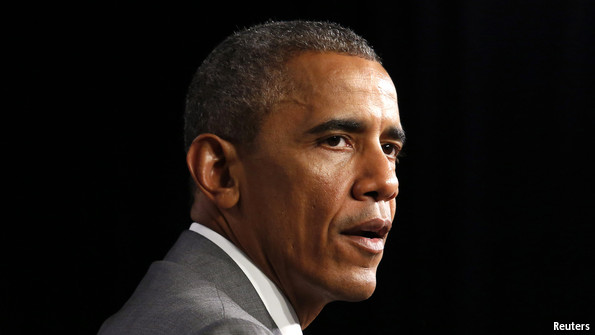

BARACK OBAMA is taking a somewhat irreverent approachto the lawsuit House Republicans voted to wage against him for exceeding the constitutional bounds of the presidency. “We could do so much more if Congress would just come on and help a little bit,” he said on Wednesday, scolding GOP lawmakers during a speech in Kansas City. “Stop just hatin’ all the time.” Chuckling, Mr Obama betrayed no anxiety about being sued. “I know they’re not that happy I’m president, but that’s OK,” he said. “I’ve only got a couple years left. Come on! Let’s get some work done.”
The irony of the lawsuit is lost on no one. Republicans cite a number of unilateral executive actions in their criticism of Mr Obama’s "imperialism", but the lawsuit concentrates on delays he has ordered in the implementation of several provisions of the Affordable Care Act. Yes, thatAffordable Care Act: the one that House Republicans have tried to repeal around 50 times. My colleague suggests that John Boehner’s move to sue the chief executive may prove to be politically savvy. The suit will certainly “rouse the base”, as W.W. puts it. But who will be roused more? Will it be Republicans who salivate at the chance to catch Mr Obama in a constitutional no-no, or Democrats who may leap to save their president from a desperate right-wing assault? Partisans on both sides are opening their wallets, though Democratic fundraisers may have the edge.
Ideological rah-rahs and fundraising implications aside, should Mr Obama be taking the lawsuit more seriously? Is there any truth to Mr Boehner’s chargethatthe president is “tear[ing] apart what our founders have built” by failing to “faithfully execute the laws of our nation”? America is a government of laws, not men, and the president is not allowed to ignore or meddle with these laws. In John Locke’s "Second Treatise of Government",a source of inspiration for America’s founders, the legislative branch of government stands above the others: “there can be but one supreme power, which is the legislative, to which all the rest are and must be subordinate.” So if Mr Obama is really usurping legislative authority, as the GOP claims, the lawsuit may in fact be justified.
But all presidents exercise some discretion in the course of carrying out their duties. And there is good reason to believe Mr Obama's decision to delay aspects of Obamacare make good sense, policy-wise. Writing in theNew England Journal of Medicine, Timothy Stoltzfus Jost and Simon Lazarus explainedin May why the president's move to postpone the implementation of the employer mandate (ie, the requirement that businesses with 50 or more employees provide approved health plans) is not exactly tyrannical:
The ACA is a massive law, imposing hundreds of requirements on federal agencies and private entities. Many provisions of the law have “effective dates” by which they were to have been put into effect. Although the vast majority of these provisions have been implemented on time, it has not been possible to meet all deadlines because of a variety of factors. These include limited resources for implementing the law (Congress has failed to appropriate any funds for this purpose since the ACA was passed in 2010), the consequent need to prioritize the use of available resources, technological limitations (including the consequences of the problematic website launch), the need to phase in the implementation of various provisions in an integrated and rational sequence, and the need to avoid unnecessary disruption of employment and insurance markets.
Basically, the employer mandate isn't ready for implementation, argue Messrs Jost and Lazarus. More work is needed to ensure it works—and that's "not uncommon” when it comes to rolling out big new regulatory schemes, they add. For example in 2003 George Bush postponed unpopular aspects of the Medicare Modernisation Act and limited enforcement of some parts of the law. Mr Obama is not breaking any new ground here.
John Locke, like John Boehner and his colleagues, worried a lot about tyranny. Mr Locke’s "Second Treatise" is a recipe for a republic protected from executive “rapine and oppression.” When a leader exercises authority “not for the good of those who are under it, but for his own private separate advantage,” Mr Locke wrote, we have trouble. But that definition of tyranny does not, to put things mildly, hold for Obamacare delays. The president is not tarrying in order to bring himself glory or riches or to ransack the liberties of the American people. Mr Boehner’s rhetoric about the Constitution-shredding inclinations of Mr Obama—and the charge from Candice Miller, a Michigan lawmaker, that the president's actions “amount to tyranny”—are therefore hilariously overblown. The republic will not buckle under if employers have another year to secure health insurance for their employees.
All that said, it is unlikely the legal merits or flaws of the Republicans' suit will ever be considered by a judge. As Lyle Denniston of SCOTUSblog observes, courts are normally loth to insert themselves into primarily political disputes between the other two branches of the federal government. Mr Obama has little to worry about.